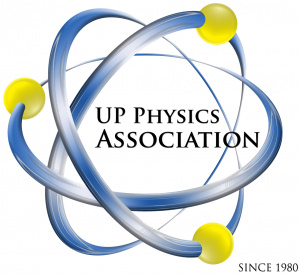Plasma Physics Laboratory: Difference between revisions
No edit summary |
No edit summary |
||
| Line 2: | Line 2: | ||
{| style="width: 17em; border-collapse: collapse;background-color: #f0f6fa; font-size: 95%; text-align: left;" | {| style="width: 17em; border-collapse: collapse;background-color: #f0f6fa; font-size: 95%; text-align: left;" | ||
|colspan="2" style="text-align: center; font-size: larger;" | '''UP PHYSICS ASSOCIATION'''<br>< | |colspan="2" style="text-align: center; font-size: larger;" | '''UP PHYSICS ASSOCIATION'''<br><small> | ||
|- | |- | ||
| colspan="2" style="padding: 1em 0; text-align: center;"| [[Image:PA logo.jpg|200px|thumb|right|Official logo of UPPA]] <br /> | | colspan="2" style="padding: 1em 0; text-align: center;"| [[Image:PA logo.jpg|200px|thumb|right|Official logo of UPPA]] <br /> | ||
Revision as of 15:41, 12 May 2012
| UP PHYSICS ASSOCIATION | |
 | |
| Established | December 17, 1980 |
|---|---|
| Motto | |
| Type | Academic Student Organization |
| EXECUTIVE COMMITTEE 2012-2013 | |
| President | Anthony R. Tuico |
| Vice President for Internal Affairs | Charmaine Rose B. Delos Reyes |
| Vice President for External Affairs | Esmerando R. Escoto |
| Secretary | Ritz Ann P. Aguilar |
| Treasurer | Ma. Cristina M. Jamerlan |
| Academic Affairs Committee Chairperson | Damian N. Dailisan |
| Membership Committee Chairperson | Floyd Willis I. Patricio |
| Public Relations Officer | Mario Juvenal S. Ongalao III |
| Projects Committee Chairpeson | Niel Gabriel E. Saplagio |
| Location | National Institute of Physics, College of Science, UP Diliman |
| Senior Faculty Adviser | Johnrob Y. Bantang, Ph.D |
| Junior Faculty Adviser | Michael Reuben M. Solis, MS |
| Website | [1] |
About Us
Plasma technology has become one of the major and important technologies in the development of materials. In the late 1980's, the Plasma Physics Laboratory (PPL) of the National Institute of Physics in University of the Philippines, Diliman was established by Dr. Henry Ramos to experiment with and develop modest plasma systems in order to acquire practical knowledge and skills to better employ technologies based on plasma physics. With grants extended by various agencies like the National Research Council of the Philippines (NRCP), the Third World Academy of Sciences (TWAS), the Office of Research Coordination of the University of the Philippines (ORC-UP), the Engineering and Science Education Program of the Department of Science and Technology (ESEP-DOST), the DOST-Grants-in-Aid, and the Japan Society for the Promotion of Science (JSPS), the PPL has built some major plasma devices over the years.
These facilities have undergone modifications and upgrading to serve as demonstration-of-principle devices for specific applications. For example, the PSTNIS facility has been designed as a source of ions for ion implantation applications. It has been utilized as well for the synthesis of nitrides (TiN, ZrN) on metal substrates. On the other hand, the SPNIS facility has also been used for the formation of TiN on metal substrates. Diamond and diamond-like-carbon (DLC) films on silicon have been deposited using the PECVD device. Various studies have been done on these facilities leading to several publications and conference papers.
Research Machines
- Plasma Sputter-Type Negative Ion Source (PSTNIS)
- Sheet Plasma Negative Ion Source (SPNIS)
- Plasma Enhanced Chemical Vapor Deposition (PECVD)
- Gas Discharge Ion Source (GDIS)
- Electron Cyclotron Resonance Plasma Device (ECR)
- Streaming Neutral Gas Ion Source (SNGI)
Diagnostic tools and techniques used by the laboratory are the following:
- Spectroscopy
- Langmuir Probe
- Mass Spectroscopy
- E x B Analyzer
Coordinator: Henry J. Ramos, Ph.D. Contact: plasma@nip.upd.edu.ph
Plasma Physics Laboratory National Institute of Physics University of the Philippines-Diliman Diliman, Quezon City 1101 Philippines


